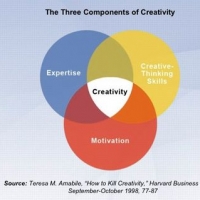Why Do Some People Have Better Ideas Than Others Do?

There is something about ideas that keeps everyone intrigued about them. Human beings are designed to think, and ideas are a natural outcome of that activity. The world we live in has been increasingly shaped by some simple ideas that turned our lives around in a positive way. But, for every idea that becomes viable, there are many ideas that couldn’t find an application.
It is evident that every idea cannot turn into a blockbuster like Post-it notes or iPods, but it is equally fascinating to think that idea generation in organizations never follows a predictable trajectory. Not everyone in an organization is good at coming up with ideas; the 80-20 rule probably applies in this context too. But one relevant question is: What is it that makes some people come up with more relevant ideas than others do?
In her work specific to business creativity, Teresa M. Amabile describes the three components of creativity: expertise, creative-thinking skills, and motivation. These three components are interdependent in a creative process and form the basis on which the ideas get generated.
Expertise can be a two-edged sword for idea generation. It gives an intellectual space that breeds ideas, but ignorance can also prove to be an able ally in the idea-generation process. In his book Medici Effect, Frans Johansson argues that innovations occur when people see beyond their expertise and approach situations actively—with an eye toward putting available materials together in new combinations.
Johansson says, "Why do so many world-changing insights come from people with little or no related experience? Charles Darwin was a geologist when he proposed the theory of evolution. And it was an astronomer who finally explained what happened to the dinosaurs." People who generate better ideas thus are smart enough to balance their expertise with ignorance and know how to successfully amalgamate the same with their creative-thinking skills.
An individual's motivation is a key factor in deciding whether one commits to do something or not. Motivation by its very definition is an inner drive, but it is often classified as intrinsic motivation and extrinsic motivation. Management in organizations usually employ extrinsic motivation methods to drive people toward contributing ideas. These include tangibles like money rewards, trophies, etc.
Motivation by monetary reward may help people do their jobs, but it would rarely make them creative. As the intrinsic motivation principle of creativity suggests, "People will be most creative when they feel motivated primarily by the interest, enjoyment, satisfaction, and challenge of the work itself, and not by external pressures or inducements."
Idea generation, often treated as a measure of quality of the human mind, is a complex phenomenon. No two individuals are alike in this regard, but those who are naturally motivated toward a cause and are able to combine their expertise with creative-thinking skills will have a definitive edge over others.
What do you think? Let me know in the Comment section below.

